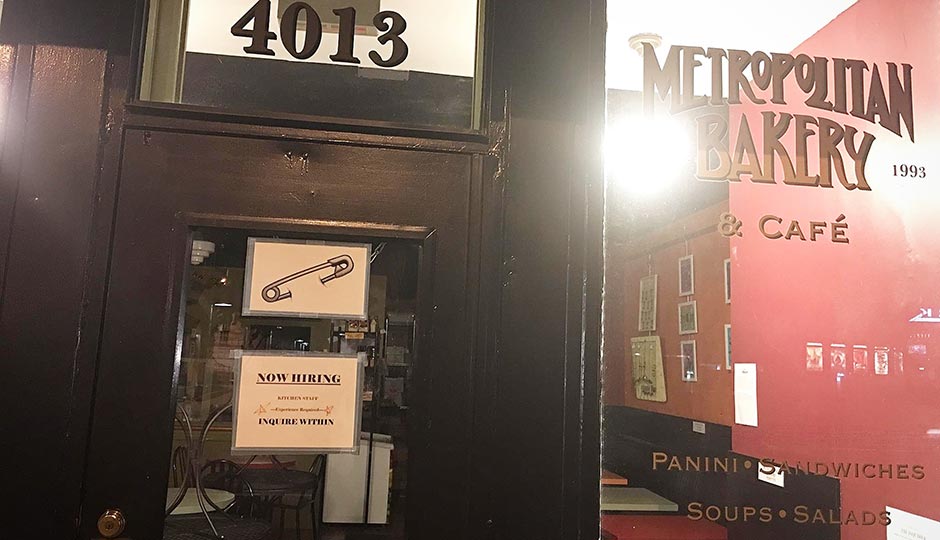How to Be a True Ally in Trump’s America

Photo by Ernest Owens
Who would have ever imagined living in a world where images of safety pins would be tacked onto buildings? Walking past Metropolitan Cafe in University City over the weekend, I noticed a bold laminated photo of a safety pin posted on the front door. Just when I thought this new crazed obsession with showcasing visible pseudo-allyship for people of color, immigrants, Muslims, and other diverse communities that Donald Trump had bashed was winding down, others have clearly taken it to the next level.
Over the past few weeks since the president-elect’s campaign victory, white people have resorted to making the safety pin the official symbol of being an ally in America. Translation: by wearing a safety pin (or attaching an image of one to your building), it is implied that you aren’t one of the majority of whites who voted for Trump and inadvertently his political bigotry. But for me as a black gay man, a safety pin doesn’t do a damn thing to change my strong distrust of the power of white supremacy and the privilege that comes with those who choose to be an “ally.”
You see, progressive supporters, however well intentioned, are as likely as anyone else to be a subconscious oppressor. The same people who support a popular black musician, such as Beyoncé (because who doesn’t love her), will be the same individuals who benefit from the gentrification of black neighborhoods and public schools. It’s almost as if one chooses to turn on or turn off the moral switch of caring about marginalized people at their own expense without ever questioning their entire lifestyle. I will never forget the time I told some of my white peers at Penn how hypocritical it was for them to march for racial justice on campus while also fearing the black men on the corner of 40th and Market for no specific reason. Whether they knew it or not, they too were holding onto a very toxic racial bias that was similar to what they were protesting against.
Further, being an ally can be counterproductive when engaged in as a conscious choice rather than as a moral obligation. Too often, I am bombarded with well-meaning white friends who seem to feel as though they deserve a gold star for speaking out against bigotry in their own back yards. It comes across as though addressing systems of oppression as a person with privilege is an inconvenience that warrants acknowledgement. But what makes it an inconvenience are the very evils that caused you to combat it in the first place. It’s simple: Doing the right thing shouldn’t require additional validation — it should already be found within the deed.
So what kind of ally should you strive to be? For starters, don’t be the lobbyist type. If you ever find yourself feeling entitled to praise for leveraging your influence, power, or privilege for someone less fortunate, that’s not allyship — it’s brokering a deal. Allyship isn’t a negotiation, but a respectful form of indebted servitude. For whatever reason, you were born into a society that gives you advantages that accrue from the detriment of others who don’t look like you — deal with it. And for that reason, you’re never going to mean well for those more disenfranchised if you feel as though you’re on the same totem pole. You’re not — it’s a fact. Even though in society we should all be treated equally, we still currently aren’t. And now that we’re entering Trump’s America, if you are a white citizen, you’re projected to be better off than the rest of us. Don’t remain in denial over the harsh reality, but instead act accordingly.
In many ways, the true type of ally is one who sees himself as a debtor. You understand that you have benefited at someone else’s expense, and now it’s time to pay up. In this case, you have been allotted privilege through the marginalization of other Americans (mainly people of color), and now you must make atonements for those subconscious and sometimes carefree decisions. For those who follow this model of allyship, it isn’t about you — it’s about the marginalized. You couldn’t care less about acclaim, because it’s what you should be doing anyway. Those who are true allies recognize that it’s about listening, learning, and improving upon repaying that debt in any legitimate way that best strengthens the mobility and equality of those afflicted.
Whether anyone wants to admit it or not, the desire to sustain white privilege subconsciously influenced the way most Trump supporters voted in this election. It’s the only way to explain why most white women voted for Trump over his female opponent despite the very sexist remarks he made toward them during the campaign. It’s the only explanation for folks still wearing “Make America Great Again” hats while knowing that the Ku Klux Klan endorsed the candidate behind the slogan.
Now more than ever, those who are the relatives and associates of such Trump supporters who didn’t vote for him must help to dismantle the very oppression that may afflict people of color during his presidency. A safety pin or any other odd symbolic item isn’t enough to ease tensions as an ally — doing the selfless work will.
Ernest Owens, the editor of Philadelphia magazine’s G Philly channel, writes regularly for BET and other major publications. You can reach him at gphilly@phillymag.com and on Twitter @MrErnestOwens.


